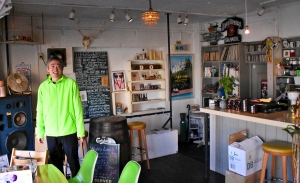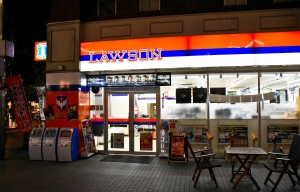By this point in my travels, the constant shifting locations, sleeping in different rooms almost every night, the cheap hotels playing piped easy listening versions of Carpenters songs (I spend the hours cycling between towns with Close to You and Yesterday Once More doing constant, maddening circuits of my head)
There are also other, weirder, more location-specific things feeding my disorientation, and perhaps the biggest problem of my stay in Niigata was keeping track of which Buddhist temples were putting on which gigs.

Enshu Kasahara is the organiser of an occasional event called Anti Music. He’s also the head monk of Shofukuji, a Buddhist temple where he hosts experimental live performances. We met at Editors Café in the old town, an arty little place near Shofukuji that does good curry and complicated lemonade, and he set about introducing me to another side of the town’s music scene from the one I had experienced at Golden Pigs the previous night.
Diesel Guitar
My discovery of Enshu and Shofukuji was initially confused by my recollections of another temple in Niigata (Saimyoji in the town of Sanjo), where the Tokyo/Kanagawa band Extruders played a gig and recorded a live album in 2011, while Enshu pointed out that Gokurakuji in Ojiya also puts on live events.
For a band like the Extruders who have no shortage of places to play, doing the show at Saimyoji was about trying something different, conceiving the performance as a prayer to Benzaiten, a deity related to the arts. For Enshu and the Anti Music shows at Shofukuji, there’s an element of straightforward practicality to it.
“When I was doing my training in Kyoto, I was going out all the time, record shopping, going to experimental music events, but when I came back to Niigata, I looked around and there was nothing. There was simply no place to do that kind of music.”
In Tokyo the situation is even more alien to Niigata, with a number of venues specialising in experimental music. In the Tokyo scene, using an unconventional venue is a matter of creative expression, not really of necessity.
I compare this to the way places like Yamagata and Iwate repurpose old buildings as arts spaces and Enshu points out that while Niigata isn’t in Tohoku, it’s very much culturally and economically part of the same broadly defined section of Japan. Musicians here face the same basic pressures.
Talk of Yamagata brings us to the film festival and Party 51 – a film he was keen to see but didn’t have the opportunity. Its portrayal of the fight over the musicians’ “home” and the parallels I’ve drawn with my own experiences in Koenji have become more poignant ever since receiving a text from the owner of Koenji One, the music bar where I’ve been DJing every month for the past six and a half years, that he is being forced to close it down. This summer Koenji lost the indie music bar October, and in September it lost Art Bar Ten, the jazz bar where I used to put on a different monthly event. Tokyo may have limitless alternative spaces to host parties, but I don’t want a space: I want a place.
The difference between a space (i.e. something vacant, waiting to be filled by whatever you put into it) and a place (i.e. something with some inherent identity and roots) is important in understanding the different kinds of relationship there are between music and the location where the music occurs. A “space” offers you freedom, while a “place” offers you a sense of belonging.
The places and spaces Niigata has to offer can be divided into the dedicated live venues, which basically includes the three Golden Pigs venues (Red, Black and Yellow), Club Riverst, and Woody. Of these, Woody is the DIY venue the local bands like, while Golden Pigs and Riverst are more professional venues, which cannibalised the location and the staff of the now defunct Junk Box venue respectively (Junk Box is a chain that also has venues in Nagano and Sendai).
Progressive Energy is a popular spot in the club scene, while the owner of Editors Café also does a small DJ bar called 88 (Hachi Hachi) that puts on smaller events. Hamajaya, a beach house on the Niigata seafront, hosts events throughout the summer.
Talking to Enshu is sometimes hard to follow because the context of what he’s discussing hops from one genre to another and back again without any kind of indication that he has changed what he’s talking about. It becomes clear as we get up and he starts to show me around the cool local spots that the reason for this is that while he is definitely in the experimental and drone music camp, he doesn’t see the differences in genres as distinct in any meaningful way. Distinctions like that are a luxury.
Mimiz (featuring Satoshi Fukushima) live at Yoshida Jinja (shrine) in Kyoto
In addition to Enshu’s own Zombenience Store project, he singles out noise/drone musician Diesel Guitar and electronic/modern classical artist Satoshi Fukushima (of the Institute of Advanced Media Arts in Gifu) for special mention, adding that in the more mainstream rock and punk scenes The Fools, Northted Works and Give Life are important acts in the local scene.
While Niigata has a lot in common with Tohoku, that isn’t the only way you can slice to country to extract meaning from it, and a different divide exists between the Pacific and Sea of Japan coasts.
“This big, important cities are all along the Pacific side, but over on this side, this area used to be called “Ura Nihon” (literally “the back of Japan” but with a more negative connotation than that alone implies) – the weather is worse, and the culture is more insular.”
Enshu also says you can make a distinction between cities with castles and those without, pointing out that historically castle towns were where the culture was, and the cultural tradition can still linger in the atmosphere. He believes as well that a lively festival culture can feed back positively into the local artistic culture in intangible ways as well.
A stop by an absurdy tiny local clothes store summons the recommendation of singer-songwriter Isamu Kitada from the owner and the embarrassed confession that she also performs with the industrial project Miminary, while round the corner, in another echo from the Tokyo version of home, a local bookshop has a CD display corner devoted to Koenji underground record store Enban. Woody doesn’t have a show on, but the boss is around and he suggest punk band the Klaxons and a rock band called 10gatsu no Drum (whose existence I can find no trace of at all*) as being worth checking out.
*I would absolutely love it if he was making bands up just as a way of bigging up his town’s music scene. In fact, I’m tempted to start doing that myself if no one else wants to take up the challenge.
The place we spend most time, however, is the record shops. She Ye Ye is a small shop specialising in a carefully curated selection of expensive rare vinyl, while Bullet covers a wider range, albeit with a bias towards prog, psychedelia and other sorts of cult music.
At Bullet, Enshu and the owner get into an animated discussion about Japanese rare groove music, winding through that into an argument about idol music, its appropriation of rare groove sounds through bands like Tokyo Girls’ Style and local stars Negicco, and whether that is part of a tradition going back to the ’70s idol scene or an entirely unconnected artifact of postmodern subculture fandom.
Haikarahakuti
In relation to the local scene, the owner of Bullet believes one of the changes that has happened in music over the past couple of decades has been a decoupling of live music and record stores, with the two attracting increasingly different crowds, and communicating less and less. He carries a few CDs by KXMXTX West of indie-funk-hip hop act Haikarahakuti, although their crate-digging tendencies perhaps make them exceptions rather than the rule in the live scene.
Other places we don’t have time to visit include King Kong, which covers a broad range of genres, and Shabby Sic Poetry, a record store in a converted house that acts as a hub for local MCs and track makers.

Niigata is a town that’s passionate about its sports, but there’s a resigned air to a lot of the music people I speak to that suggests they feel they occupy a more precarious position of relevance. Enshu cites music journalist Akira Aida’s example, as the organiser of the Jiyuu Kukan Festival and an important figure in making Niigata an important hub for the Japanese jazz scene of the 1970s.
“When we started out doing Anti Music, I didn’t know who Akira Aida was,” he explains, “And then when I discovered him, I was amazed that there was someone who was doing something amazing like that in Niigata.”
The worry is that when Enshu stops, everything he’s doing will fizzle out again. The generation coming through at the moment in Niigata is perhaps best represented by the Experimental Rooms crew, who put on events of a slightly more commercial nature than Anti Music, albeit with a certain amount of thematic crossover (they’re hosting Inga Copeland at their next event). Nevertheless, it’s worth noting that while a small music scene means that just one or two people han wield a lot of influence and have a lot of power to shape things in their own way, that influence cuts both ways, meaning that unless the foundations you build are solid, everything vanishes just as easily.
As Enshu talks about these worries, I’m thinking about my own tiny scene in Koenji, the infrastructure that supports it getting gradually chipped away. Because of Tokyo’s size and the huge mass of things going on there all the time, what I’m doing there is never going to matter as much as what the Anti Music or Experimental Rooms people are doing in Niigata, but that just underscores its fragility all the more.
It’s also abundantly clear, however, that the perseverence is the most valuable quality among anyone who sets themselves the task of nurturing independent music, wherever it is. Please, I think to myself, let that be the lesson I learn here.








